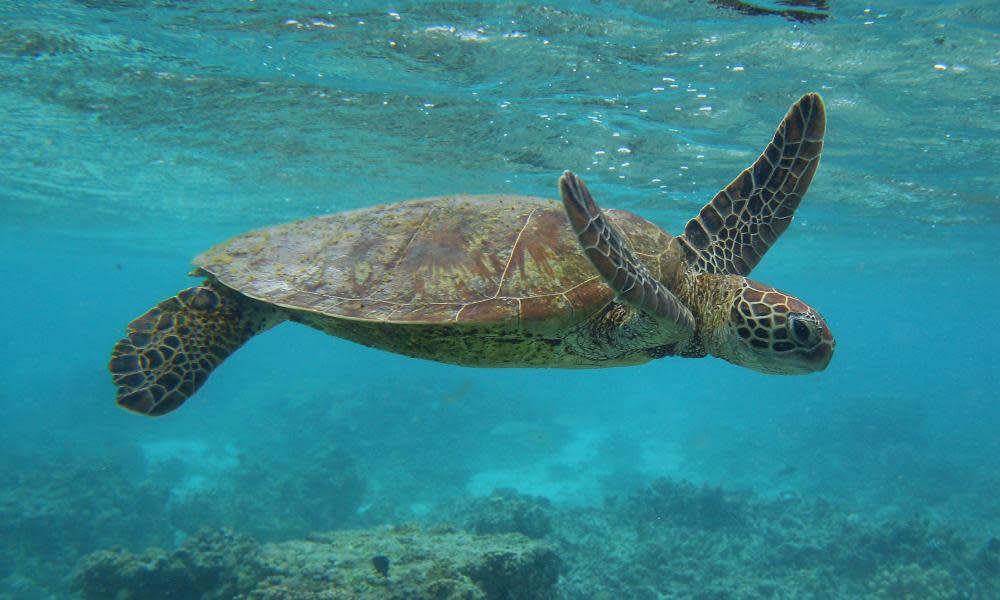Greens signal they may not back Labor in blocking Coalition's marine park plans

The Greens have signalled that they might not back a move by Labor to disallow controversial new marine park management plans proposed by the Turnbull government, calling for time to consider their position.
The Greens’ healthy oceans spokesman, Senator Peter Whish-Wilson, told Guardian Australia on Thursday that if the new government plans were disallowed, “then we move from some protections to no protections, and the protections of our oceans have to rely on Labor winning government and the conservative major and minor parties not having the numbers to disallow whatever plans Labor put in place”.
The government’s new management plans were uploaded by officials on the federal register of legislation on Tuesday, cutting across a public announcement the government planned to make on Wednesday.
Labor’s environment spokesman, Tony Burke, said as soon as the plans appeared he would move to disallow them, branding the change the “largest removal of marine area from conservation, ever, from any government in the world”.
Given that the government’s proposal winds back the number of “green” zones – the no-take areas, where extractive activities including fishing and collecting are not allowed without a permit – the expectation was that Labor’s move would be backed by the Greens.
But the party is yet to reach a decision. “What the Liberals have before the Senate is woefully inadequate and doesn’t deserve the name of a marine reserve,” Whish-Wilson said on Thursday.
“But the dilemma facing the environment movement and communities who have campaigned for decades to get marine protections in place is whether a disallowance might mean no protections at all for the next decade.”
Advice prepared for the Greens from the parliamentary library is equivocal about the impact of the disallowance.
The advice says: “It appears possible that there will be greater controls on activities such as commercial fishing in the relevant Commonwealth reserves with the management plans as tabled, when compared to the current management regime for those reserves with no management plans in place.”
They’re worse than no protection because they imply that we’ve solved the problem
Jessica Meeuwig, Centre for Marine Futures
It says the director of national parks has issued a number of general approvals under the Environment Protection and Biodiversity Conservation Act which allow a range of general activities to continue in marine reserves. “If the management plans were to be disallowed, it is possible that similar general approvals would be reinstated.”
Whish-Wilson says Burke is “being disingenuous by saying these plans are a step backwards from what is there now. He never got the protections in place before Tony Abbott won office and right now these areas have no protections … Until there is a plan of management, these are marine parks on paper only.”
The Greens want to consult experts and the environment movement before committing to a position. One expert and one environmental group on Thursday called for the disallowance to be supported.
Jessica Meeuwig, director of the Centre for Marine Futures at the University of Western Australia, said she thought the management plans should be stopped by parliament. “Normally I would say, ‘This has been a long process, let’s get something done,’” Meeuwig said. “But this one is just not remotely acceptable.
“They’re worse than no protection because they imply that we’ve solved the problem. As a scientist my concern is that if we get them up, everyone will tick the box and think we’ve solved the problem.”
Meeuwig said the science had been ignored, and there was no evidence the partial protections proposed would have any significant environmental benefit. “I’m not going to say that there aren’t some benefits but they’re so small relative to cost.”
An analysis by leading scientists of the Coalition’s changes to Labor’s plans found the reductions in “no-take” zones would have minuscule economic benefits, while undermining most of the environmental benefits.
The entire reduction of no-take zones in the Coral Sea, for example, which amounts to a reduction twice the size of Tasmania, would mostly benefit the eastern tuna and billfish fishery, most of whose operation is outside the marine reserve anyway.
The researchers found the reduction in no-take zones would increase their catch by just 10%, which is less than the normal year-to-year fluctuation in the fishery. “Because these plans are so flawed, disallowance is one of the few options left,” Meeuwig said.
This view was backed by Richard Leck, WWF-Australia’s head of oceans, who said the disallowance motion being pursued by Labor should be supported.
“These are 10-year plans to lock in a decade of management plans that are insufficient to protect the Coral Sea,” Leck said. “It doesn’t have scientific integrity and it doesn’t have the backing of the Australian people. WWF just can’t support something that is not fit for purpose.”
He said changing the plans within a decade would be complicated, since they include compensation for extractive industries that are impacted. “We know that once these plans are in place the likelihood that they will be revisited in the next decade is low,” Leck said.

 Yahoo News
Yahoo News 
